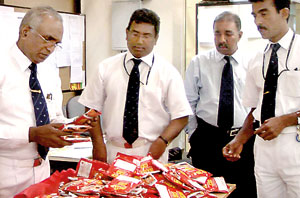News
Flavoured tobacco-based intoxicants target teens for long term addiction
By Chamal WeerakkodyA Sri Lankan who arrived from Chennai on Wednesday, was arrested by the Customs’ Airport Narcotics Branch at the Bandaranaike International Airport (BIA), for carrying 100 kg. of flavoured chewing tobacco.
Airport Customs Superintendent G.G. Premasiri told the Sunday Times that a resident of Grandpass was apprehended for bringing in chewing tobacco worth Rs. 15,000,000, hidden in his hand luggage.
He was fined Rs. 100,000 by court and the contraband confiscated.Ten days earlier, a Sri Lankan woman returning from Chennai was arrested with a similar stock.Customs’ Narcotics Branch Deputy Superintendent D.D.S.C. Michael told the Sunday Times that the woman was arrested for carrying 27 kg. of tobacco-based intoxicants.

Chewing tobacco that was detected at the BIA. Pic by S. Kumarasinghe
The contraband was hidden inside a rice cooker box, a food warmer box and inside shirt boxes, which she attempted to smuggle out of the BIA.
Later, she was warned and discharged by court.According to the Food and Drugs Act, it is illegal to export or import any tobacco-based product, without the permission of the relevant authorities. Import and export of tobacco-based products are permitted with the authorization of the Health Ministry.
“Tobacco based intoxicants are the gateway for children to be induced into using other intoxicants,” said National Dangerous Drug Control Board Chairperson Ms. Leisha De Silva Chandrasena. She said that tobacco-based products introduce the youth of the country to other worse intoxicants, starting with cigarettes and going on to hard drugs such as heroin and cocaine to ruin their future.
She pointed out that the dealers and the tobacco-based industries are the culprits who promote such activities and ruin children’s future.
Ms. Chandrasena said these products are mostly smuggled into the country for sale among school children, so that, once they are addicted to these tobacco-based products, not realising that they are consuming tobacco, are likely to demand more from the traffickers.
“Promoting the use of tobacco-based products not only affects the younger generation, but the older ones too, because children could influence the adults around them with these items ,” she said.
She also mentioned that, with the increase in tourist arrivals, there is greater demand and by the inherent loopholes, their availability in the country, thus impacting adversely on the younger generation. She said that dealers often target children from rural and suburban areas, especially of affluent families, as they have the money and are easy prey.
Ms. Chandrasena was of the view that the most vulnerable of school children are those of households where both parents are breadwinners, and hence, after school, came home to empty houses with no adults, and are easily susceptible to peer pressure and outside influence.
She stated that parents and teachers, along with the media should involve in public prevention programmes to enable children understand the consequences of this harmful and wasteful use of tobacco-based intoxicants and help them stay out of it.
A senior Customs official said there are various types of tobacco-based intoxicants that come to Sri Lanka from India, Pakistan, Afghanistan, Philippines and at times from South America.
According to the Alcohol and Drug Information Centre (ADIC), Anuradhapura, Galle, Colombo, Kegalle, Ampara, Gampaha and their immediate environs are the most affected areas of tobacco-based intoxicants. “Tobacco usage, by and large, is one of the biggest destructive influences in a child’s educational, social, cultural and physical life,” said Consultant Community Physician Dr. Anura Jayasinghe.
Drug dealers who traffic in tobacco based intoxicants target teenagers, who are vulnerable enough to get addicted to these intoxicants and demand for more, said Dr. Jayasinghe.He said diseases caused by the use of tobacco-based intoxicants are life-threatening.
He also said that tobacco consumption mostly affects the lungs and heart, through heart attacks, strokes, emphysema, chronic obstructive lung disease and cancer (oral and lung).
According to the World Health Organisation (WHO) reports, tobacco usage results in 20,000 deaths annually.
NATA-Bloomberg Project Coordinator Dr. Prasanna Cooray said dealers of tobacco-based intoxicants target teenagers with flavoured products, with the clear intent of getting them addicted thus paving the way for long-term usage.















